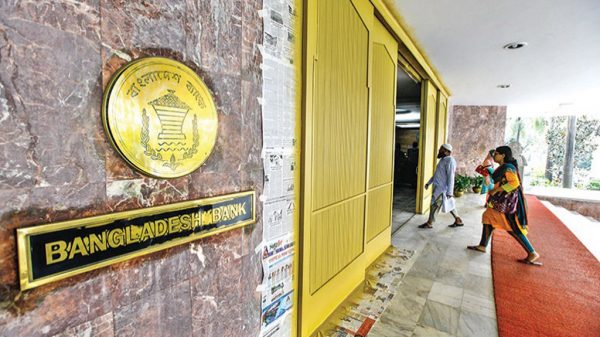Liquidity support for weak banks: BB under pressure

Shawdesh desk:
The emergency liquidity support to scam hit banks against the backdrop of high presence of printing money in the economy due to record borrowing by the ousted Awami League regime has made the task of containing inflation challenging for the interim government.
Calling the borrowing from Bangladesh Bank as the worst form of credit to meet the resources crunch and revenue shortfall, economists said that such borrowing by the previous regime shot up to more than 1.5 lakh crore by June 2024.
The interim government has paid back the loan, but still the net outstanding borrowing from the central was five times higher at Tk 1,15,769.88 crore on November 14, compared to Tk 21,48 2.27 crore on November 29, 2021.
‘The borrowing amount is more than double the outstanding of the past 50 years,’ said Mohammad Abdur Razzaque, chairman of the Research and Policy Integration for Development.
The government borrowing from the central bank and paying back those within a short period of time are common phenomena, but a reverse picture depicts serious challenges in containing inflation, he said.
The high inflation which has been keeping the majority of the people in great distress over the past two years continued its upward movement to 11.38 per cent in November on the back of price hikes of food items in both rural and urban areas.
International Monetary Fund has already forecast that inflation would remain at elevated level over the next six month.
Liquidity support to scam hit banks by the BB in the previous regime, mostly through printing money, and also emergency loans to the same banks and crisis hit big groups to avert unwanted situations have made the challenge more critical.
The BB management under the interim government decided not to release on the market any money by printing, but failed to maintain the stance as it had to assist crisis-hit commercial banks and large business groups.
On November 29, the BB provided Tk 22,000 crore loan facility to seven crisis-hit commercial banks, including five Shariah-based banks — Islami Bank Bangladesh, Social Islami Bank, First Security Islami Bank, Union Bank and Global Islami Bank — which were previously controlled by controversial S Alam Group, one of the oligarchs linked to the AL regime.
BEXIMCO Group, another oligarch linked to the same regime, received Tk 60 crore from the government in November and Tk 180 crore from the BB in December to clear the wages of its workers.
Emergency loan assistances have also been provided to National Bank and Padma Bank.
Policy Exchange Bangladesh chairman M Masrur Reaz lamented that the entire nation had been continuing to pay penalties for appropriation of bank funds and printing money by the AL regime.
State-owned Janata Bank that has defaulted loans worth about Tk 24,682 crore with BEXIMCO Group and Tk 101 crore with S Alam Group sought Tk 10,000 crore from the BB as bailout fund.
Problem-hit Padma Bank has applied to the Bangladesh Bank for Tk 1,300 crore in liquidity support to mitigate its liquidity crisis.
Echoing Zahid Hussain the PEB chairman said such liquidity assistance to banks and crisis hit groups could not be given repeatedly.
Economists suggest that the government should give a specific timeframe in assisting the scam-hit banks and crisis-hit groups who enjoyed undue to privileges under the past regime.
The White Paper on State of the Bangladesh Economy that mainly highlighted corruptions, irregularities and policy blunders of the AL regime said, ‘Fiscal and political dominance of monetary policy exacerbated inflation volatility.’
‘The fiscal and political dominance of the BB were out in the open,’ said the white paper prepared by a 12-memebr committee headed by Centre for Policy Dialogue distinguished fellow Debapriya Bhattacharya.























Leave a Reply